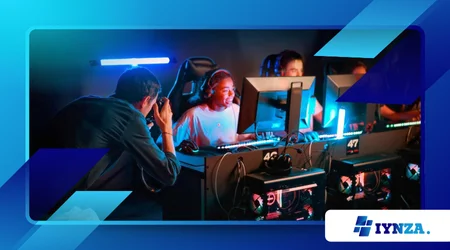The Future of Esports: Trends and Predictions for the Next Decade

Esports has transformed from a niche hobby into a multi-billion-dollar global industry, attracting millions of fans, professional players, and corporate sponsors.
Anúncios
Over the past decade, competitive gaming has seen explosive growth, with massive prize pools, sold-out arenas, and dedicated esports leagues across multiple game genres.
As technology advances and gaming culture evolves, what does the future hold for esports? The next decade promises even greater expansion, new trends in gameplay, monetization, and audience engagement, and a deeper integration of esports into mainstream entertainment.
This article explores the key trends and predictions that will shape the future of esports.
1. Expansion of Esports into the Mainstream
Esports is no longer just an online subculture—it is becoming an integrated part of mainstream sports and entertainment.
Esports in the Olympics and Traditional Sports
The conversation around esports as an Olympic event is gaining traction. With the inclusion of esports in the 2023 Olympic Esports Series, we can expect more official recognition in future Olympic Games.
Major sports leagues, such as the NBA, NFL, and Formula 1, are already investing in esports teams and competitions. This trend will likely continue, bridging the gap between traditional sports and digital competition.
Read more: Esports & Competitive Gaming
Celebrity and Corporate Investments
More celebrities, athletes, and investors are entering the esports space. Figures like David Beckham, Michael Jordan, and Drake have already backed esports teams. This influx of investment will drive higher production quality, better player salaries, and more global tournaments.
2. Advancements in Gaming Technology
The evolution of hardware, software, and connectivity will play a crucial role in shaping the esports landscape.
Cloud Gaming and Streaming Services
With cloud gaming platforms like NVIDIA GeForce Now, Xbox Cloud Gaming, and PlayStation Now, esports could become more accessible, removing the need for expensive gaming rigs. Players will be able to compete from anywhere with high-speed internet, making professional gaming more inclusive.
5G and Low Latency Gaming
The rollout of 5G networks will drastically reduce latency, allowing for seamless online competition. Faster connections mean smoother gameplay, better reaction times, and a fairer playing field for all competitors.
AI in Competitive Gaming
Artificial intelligence is already being used for game balancing, cheat detection, and player coaching. AI-driven analytics will help teams improve strategies, analyze opponents, and optimize performance in real-time.
3. The Rise of Mobile Esports
Mobile gaming is the fastest-growing segment in the esports industry, with games like PUBG Mobile, Free Fire, and Mobile Legends dominating markets in Asia, Latin America, and Africa.
Lower Barriers to Entry
Unlike PC and console esports, mobile esports requires minimal investment in hardware, making it more accessible to a broader audience. The rapid adoption of smartphones worldwide will fuel further growth.
More Competitive Mobile Tournaments
Developers are investing heavily in mobile esports leagues, offering massive prize pools and sponsorship deals. Events like the PUBG Mobile Global Championship and the Free Fire World Series already attract millions of viewers.
4. The Growth of Virtual and Augmented Reality Esports
As VR and AR technology continues to improve, we may see a new era of immersive esports experiences.
VR Esports on the Rise
Games like Echo VR and Blaston are leading the charge in virtual reality esports. As VR technology becomes more affordable and accessible, more competitive titles will emerge.
Augmented Reality Integration
AR could revolutionize spectator experiences, allowing fans to view live stats, player data, and replays in real time through AR headsets or smartphone apps.
6. Monetization and Career Opportunities in Esports
With esports’ rapid expansion, new monetization models are emerging, creating opportunities for players, streamers, and content creators.
Player Salaries and Sponsorships
Top-tier esports players already earn millions from tournament winnings, endorsements, and streaming. As the industry grows, more stable salaries, benefits, and career longevity will become standard.
The Rise of Esports Content Creators
Many professional players are transitioning into streaming, coaching, and content creation, leveraging platforms like Twitch, YouTube, and TikTok to build audiences and generate income.
7. Esports Betting and Fantasy Leagues
Just like traditional sports, esports betting is experiencing massive growth, attracting both casual and professional gamblers.
The Legitimization of Esports Betting
More countries are legalizing and regulating esports gambling, making it a lucrative market for betting platforms. However, this also raises concerns about match-fixing and gambling addiction, prompting regulatory oversight.
Fantasy Esports Leagues
Fantasy esports leagues, similar to fantasy football or basketball, allow fans to draft teams, compete in challenges, and win prizes based on real-world esports performance.
Frequently Asked Questions (FAQ)
1. Will esports ever be in the Olympics?
Esports has already been included in Olympic Esports Week, and discussions about its inclusion in future Olympic Games are ongoing.
2. Which games will dominate esports in the next decade?
Games like League of Legends, CS2, Valorant, Fortnite, and emerging VR titles are expected to remain dominant.
3. How can someone start a career in esports?
Aspiring professionals can join amateur leagues, participate in collegiate esports, stream their gameplay, or work behind the scenes in game development and event management.
4. Is mobile gaming really the future of esports?
With mobile gaming’s rapid growth, lower entry barriers, and increasing tournament support, mobile esports will continue to expand and attract new players worldwide.
5. How will AI impact esports?
AI will enhance training, improve game balancing, and assist with cheat detection, making esports more competitive and fair.
Conclusion
Conclusion
The future of esports is brighter than ever, with continued growth in viewership, sponsorships, and technology. Over the next decade, we will see greater mainstream adoption, the rise of VR and mobile gaming, and increased investment in collegiate esports.
Esports is no longer just a gaming subculture—it is evolving into a global industry that rivals traditional sports in scale and influence. As new technologies and business models emerge, esports will continue to revolutionize entertainment, competition, and career opportunities for gamers worldwide.
Beyond just gaming, esports is becoming a cultural phenomenon, influencing industries such as entertainment, education, and even business. The rise of virtual and augmented reality, AI-driven analytics, and cloud gaming will redefine how esports is played and experienced. Meanwhile, the increasing number of universities and high schools offering esports programs is solidifying professional gaming as a legitimate career path.
The next decade will also witness more lucrative sponsorships, improved player salaries, and the continued expansion of competitive gaming into mainstream sports broadcasting. With global audiences growing every year, esports is set to become one of the most dominant entertainment industries of the 21st century.
For players, fans, and investors alike, now is the perfect time to be part of this ever-evolving landscape. Whether through competition, streaming, coaching, or game development, the future of esports holds limitless possibilities for those who embrace innovation and adaptability.
